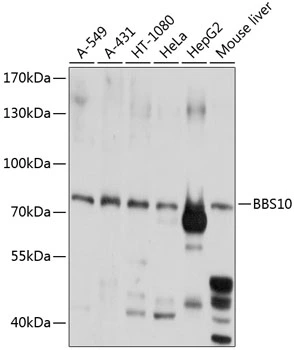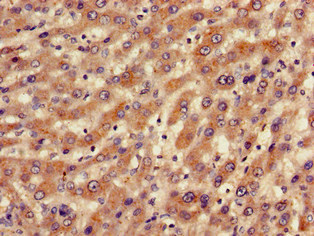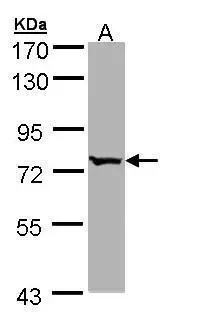
WB analysis of various sample lysates using GTX66542 BBS10 antibody. Dilution : 1:1000 Loading : 25μg per lane
BBS10 antibody
GTX66542
ApplicationsWestern Blot
Product group Antibodies
ReactivityHuman, Mouse
TargetBBS10
Overview
- SupplierGeneTex
- Product NameBBS10 antibody
- Delivery Days Customer9
- Application Supplier NoteWB: 1:200 - 1:3000. *Optimal dilutions/concentrations should be determined by the researcher.Not tested in other applications.
- ApplicationsWestern Blot
- CertificationResearch Use Only
- ClonalityPolyclonal
- ConjugateUnconjugated
- Gene ID79738
- Target nameBBS10
- Target descriptionBardet-Biedl syndrome 10
- Target synonymsC12orf58, BBSome complex assembly protein BBS10, bardet-Biedl syndrome 10 protein
- HostRabbit
- IsotypeIgG
- Protein IDQ8TAM1
- Protein NameBBSome complex assembly protein BBS10
- Scientific DescriptionThis gene is a member of the Bardet-Biedl syndrome (BBS) gene family. Bardet-Biedl syndrome is an autosomal recessive disorder characterized by progressive retinal degeneration, obesity, polydactyly, renal malformation and cognitive disability. The proteins encoded by BBS gene family members are structurally diverse and the similar phenotypes exhibited by mutations in BBS gene family members is likely due to their shared roles in cilia formation and function. Many BBS proteins localize to the basal bodies, ciliary axonemes, and pericentriolar regions of cells. BBS proteins may also be involved in intracellular trafficking via microtubule-related transport. The protein encoded by this gene is likely not a ciliary protein but rather has distant sequence homology to type II chaperonins. As a molecular chaperone, this protein may affect the folding or stability of other ciliary or basal body proteins. Inhibition of this proteins expression impairs ciliogenesis in preadipocytes. Mutations in this gene cause Bardet-Biedl syndrome type 10. [provided by RefSeq, Jan 2010]
- ReactivityHuman, Mouse
- Storage Instruction-20°C or -80°C,2°C to 8°C
- UNSPSC41116161




